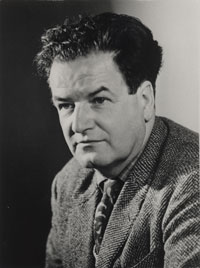Christopher Hill (Historian)
| Christopher Hill | |
|---|---|
 |
|
| Born |
John Edward Christopher Hill 6 February 1912 York, Yorkshire, England |
| Died | 23 February 2003 (aged 91) Chipping Norton, Oxfordshire, England |
| Cause of death | Alzheimer's disease and cerebral atrophy |
| Nationality | United Kingdom |
| Spouse(s) | Inez Waugh (née Bartlett) Bridget Irene Mason (née Sutton) |
| Children | Four |
| Academic background | |
| Education | St Peter's School, York |
| Alma mater | Balliol College, Oxford |
| Academic work | |
| Discipline | Historian |
| Sub discipline | 17th-century English history |
| Institutions |
All Souls College, Oxford University College of South Wales and Monmouthshire Balliol College, Oxford Open University |
| Notable students | Brian Manning |
John Edward Christopher Hill (6 February 1912 – 23 February 2003) was an English Marxist historian and academic, specialising in 17th-century English history. From 1965 to 1978, he was Master of Balliol College, Oxford University.
Chris Hill was born on 6 February 1912, Bishopthorpe Road, York, to Edward Harold Hill and Janet Augusta (née Dickinson). His father was a solicitor and the family were devout Methodists. He attended St Peter's School, York. At the age of 16, he sat his entrance examination at Balliol College, University of Oxford. The two history tutors who marked his papers recognised his ability and offered him a place to forestall any chance he might go to the University of Cambridge. In 1931 Hill took a prolonged holiday in Freiburg, Germany, where he witnessed the rise of the Nazi Party, later saying that it contributed significantly to the radicalisation of his politics.
He matriculated into Balliol College in 1931. In 1932, he won the Lothian Prize. He graduated with a first-class Bachelor of Arts degree in modern history in 1934. Whilst at Balliol, Hill became a committed Marxist and joined the Communist Party of Great Britain in the year he graduated.
After graduating, he became a fellow of All Souls College. In 1935, he undertook a ten-month trip to Moscow, Soviet Union. There he became fluent in Russian and studied Soviet historical scholarship, particularly that relating to Britain. After returning to England in 1936, Hill accepted a teaching position as an assistant lecturer at the University College of South Wales and Monmouthshire. During his time at Cardiff, Hill attempted to join the International Brigade and fight in the Spanish Civil War but was rejected. Instead, he was active in helping Basque refugees, displaced by the war. After two years at Cardiff, he returned to Balliol College in 1938 as a fellow and tutor of history.
...
Wikipedia
